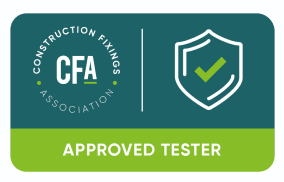Geotechnical testing could, in a way, be described as the ‘groundwork’ that needs to be done before any construction takes place. Indeed, often before any design work takes place. Geotechnical testing basically makes sure that the ground you want to build on is suitable for what you intend to build. And, if not, what remedial works may be needed to make it suitable.
Most of these tests can be done with no need for any downtime, which is vital for keeping your projects on time and on budget. Plus, if you use Perry Testing Ltd to carry out these tests, the reports can be created immediately, so you don’t have to wait for the all-important reports to be issued.
We offer a number of types of in-situ testing. If you’re not sure what you need, call us and speak to one of our experienced engineers. We’re always happy to help.
Geotechnical Tests
California Bearing Ratio Testing (CBR)
The CBR test is a simple strength test described in BS1377: Soils for Civil Engineering Purposes: Part 9. It basically replicates the stresses soils will encounter from wheel loads. This site investigation test will tell you how thick the materials need to be for the purposes of building pavements and roads. A plunger will be forced into the ground, this measures the pressure required to penetrate the soil. The results of our CBR testing are then translated into a report which can be issued on-site, instantly, so there are no expensive and disruptive shutdowns.
Incremental Plate Load Testing
These tests are used to find out the weight-bearing capabilities of a surface or material. This is usually done before plant arrives on site, so that you can be sure that the surface is safe for crane and pile mats. Perry Testing Ltd adheres to BS 1377: Soils for civil engineering purposes when carrying out these tests, so you can be sure that you are meeting all the regulatory requirements for your project. We can provide reports instantly, so you can get on with the job quickly and with minimal disruption.
Dynamic Cone Penetrometer Testing (DCP)
This test is designed to check pavement and road stiffness and condition, using a Dynamic Core Penetrometer to determine the CBR value. It checks the thickness and location of the underlying soil and is another test that can be carried in-situ with an instant report and no downtime needed.
Hand Shear Vane Testing
This is used to test the undrained shear strength of the cohesive soils, we use a hand-held instrument to do this. Our experienced engineers can provide reports instantly, on site, supplying the required certificates quickly and efficiently. The test results can be presented in either Kn/M², or we can use the BS 1377 calculations to provide and vane shear strength if that’s what you’d prefer.
Sand Replacement Density and Core Cutter Density Testing
These two tests are related, core cutter density is used for cohesive materials, such as clay and sand replacement density (SRD) is used for measuring the density of natural soils or imported materials. This test is usually used in the construction of pavement and road design to determine the degree of compaction required, which is a requirement for road and site specifications. Perry Testing Ltd adheres to the testing procedure detailed in BS 1377: Soils for Civil Engineering purposes: Part 9, so you can be sure everything is as it should be before commencing with the final layers.
If you have any questions, why not get in touch? A member of our team will be only too happy to help.







